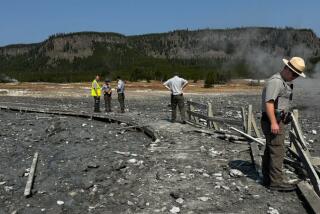Unfaithful Geyser Keeps ‘Em Guessing
- Share via
YELLOWSTONE NATIONAL PARK, Wyo — YELLOWSTONE NATIONAL PARK, Wyo. -- Steam wafted over Hank Heasler as he stood on a boardwalk and watched water from Steamboat Geyser shoot into the air with an attention-grabbing “WHOOSH!”
“This could be it,” the park geologist said excitedly, squinting against the morning sun at the impressive spray. But Heasler had no better idea than the tourists around him when the world’s tallest geyser would next erupt.
Unlike Old Faithful, Steamboat is anything but predictable. It has gone as few as four days and as many as 50 years between major eruptions -- noisy, powerful spectacles that can send hot water 300 feet or higher and churn out dense steam for hours.
Recently, though, it has been more active -- its two eruptions so far this year came just weeks apart -- and the emergence of a forceful new thermal feature nearby has scientists like Heasler wondering: What’s happening in Norris Geyser Basin, where Steamboat is located?
“That’s the million-dollar question. It’s changing more than anyone has noticed before,” Heasler said. “Are we noticing because we’re looking? Or because something is abnormal?”
Researchers are trying to find answers. They’ve installed monitoring devices throughout the basin -- near features such as Steamboat and in creek channels that collect water runoff from geysers -- to gather data on such things as water temperature and flow levels, basic information, they say, was previously lacking and could help unlock the mysteries of Norris.
Among them: What’s bubbling beneath the shallow surface of the volatile basin and why has the basin floor been steadily bulging over the last few years?
Adding to the intrigue is Norris’ location. The basin -- filled with hot springs, geysers and steam vents called fumaroles -- is outside Yellowstone’s caldera, formed by the last volcanic eruption about 640,000 years ago and considered the hotbed for geothermal activity in the park.
Some 10,000 hot springs and geysers pock the park’s landscape, their telltale steam often visible to tourists traveling park roads. But the Norris basin is frequently passed by, viewed from the car by motorists headed south to Old Faithful.
Perhaps the reason Norris is so dynamic, researchers say, is that there’s molten material beneath the basin. Or, maybe, hot water from the caldera has pushed north to Norris.
The trouble is, very little is known about the inner workings of Norris, where a geyser eruption can trigger the draining -- it looks like the flushing -- of a nearby pool.
Scientists for years have studied features within the basin -- Steamboat, for example, or Echinus, the world’s only acidic geyser. But the basin’s “vital signs,” like the amount of heat it puts out or the volume of water it generates, are hard to come by.
Relying now on grants, researchers hope to continue monitoring efforts for at least the next three years, using what they find with satellite imagery and other information, such as climate data, to help piece together the puzzle.
“Our goal is to understand what’s driving the volcanic system, and are there indications it could be moving into a period of unrest?” said Jacob Lowenstern, a researcher for the U.S. Geological Survey and scientist-in-charge of the Yellowstone Volcano Observatory, a consortium that monitors the volcano and regional earthquakes.
Better understanding the Norris basin in west-central Yellowstone and its volatility is important to ensuring visitor safety. But nothing that’s happened so far is reason for alarm or indicative of some looming threat, he said. Steamboat’s renewed eruptions and the basin rising several centimeters in the last few years could just be normal activity, Lowenstern said.
Steamboat’s first major eruption was reported in 1878. It flared up occasionally after that before lying largely dormant from 1911 to 1961. The 1960s and the early 1980s were fairly active, observers say.
Then it was quiet until it erupted in May 2000, researchers say, followed by two eruptions in 2002 and two more again this spring -- on March 26 and April 27.
Paul Strasser, a self-proclaimed “geyser gazer” from Colorado, has returned to the park religiously to document even the minor stirrings of Steamboat since seeing the first of two major eruptions in 1982.
Although Strasser doubts that it will ever be predictable or that its activity is somehow linked to the inner workings of Norris, he believes that Steamboat may behave a certain way leading to an eruption.
“Steamboat does what it darn well wants to,” he said. “Whether there is more activity now, I don’t know. All I can look for is the patterns.”
Heasler said the new research could help determine if Steamboat is a predictor of more significant activity in the basin. But, for now, he is like the tourists and interpretive Ranger John Tebby, taken with the shooting spray of the almost daily minor bursts and hoping to be around for the next big one.
“It’s one of the reasons I love being here, having the chance to see it,” Tebby said. “It’s like they say: You can’t win the lottery unless you buy a ticket.”
More to Read
Sign up for Essential California
The most important California stories and recommendations in your inbox every morning.
You may occasionally receive promotional content from the Los Angeles Times.










